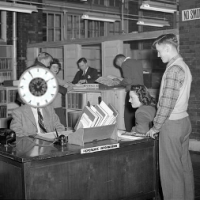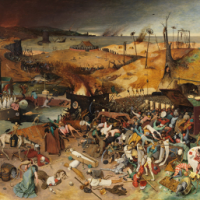Things I Learned During My First Semester of Teaching Undergraduates
Despite having spent a lot of time in classrooms (a heck of a lot of time in classrooms), the fall semester of 2015 may well have been the semester in which I learned the most while sitting in a classroom. Incidentally, it was also the first semester in which I found myself sitting at the front of the classroom facing the inquisitive eyes (and blank stares) of undergraduates.
For this fall semester I had the privilege of working as a Teaching Assistant (TA) for an introductory course on media studies – and in this position one of my responsibilities was teaching two recitation/discussion sections. At the outset let me state emphatically that I found it to be a highly interesting and rewarding experience and that I think I made a pretty good TA (the students refrained from pelting me with chalk and tried to be subtle about using Facebook in class). And though I hope my students learned much from me, I also believe I learned much from them (cue the soundtrack going “awwww”), and many of the things I learned are things I wish I had known going into the class.
And thus, in the hopes of providing helpful advice to others who are soon to find themselves facing the expectant gaze of newly minted undergraduates I would like to offer the following list of things my students taught me this semester.
They may type very quickly, but that doesn’t mean you’re talking slowly enough
Evidently I talk too fast. During the first several weeks of class the thing I heard most often from my students was some variation of “can you say that again?” Each day of class I would start off by giving the students a sort of bullet pointed list of the key points from the week’s lectures – admittedly I would try to go through these quickly so that we could get to the discussion part of the class. However, I swiftly realized that I needed to read through these lists twice. And I also realized that I needed to take long pauses between bullet points in order to give the students enough time to catch up. Is this point mundane? Yes. Is this pretty obvious? Sure. But it’s the kind of thing that’s so obvious that it’s easy to overlook until somebody actually raises their hand and says “repeat that!”
Slideshows make great punctuation
Confession: I do not like power point presentations. And though I understand why many teachers use them, I’ve never been a fan. On my first day of class I walked in without a power point (it was a class focused on discussion after all) and did not pine to have one on the screen behind me. But then a funny thing happened. For the class in which we were discussing visual culture I put together a slide show (images only, no text) so that we would have some visual material to analyze. I was rather caught off guard by how well it worked. The slides gave the students something to comment on, and students who were on the quieter side were able to participate by talking about the images right there in front of them. It actually turned out to be a good way to structure the class, using various images to punctuate points and to lead from one topic to the next. It also served as a great way to help drive home certain points – the class was pretty heavily based around some hefty theoretical concepts but using images to unpack these ideas seemed to work well. It also made it easy to insert some levity into the class. Also, it gave the students something to look at other than me. Alas this does bring us right to the next point…
They don’t get jokes about Star Trek: The Next Generation and no, they haven’t seen that movie
I will now reveal my favorite power point presentation joke. This is an excellent joke and you are free to use it. All you need to be doing is presenting about some topic that allows you to bring up that you have “some more data on that” and then you go to the next slide which has a picture of Lieutenant Commander Data from Star Trek: The Next Generation. I know you’re sitting there thinking to yourself “that’s not actually a very good joke” but you are wrong. Sorry. Alas, when I used this joke in class (during a discussion of “big data”) I flipped to the image of Data and there was not the slightest laugh. Now, I should admit that I have a tendency to tell not exactly the best jokes (as those familiar with this blog or its accompanying twitter feed know) and have something of a bad habit of punning, but throughout the class most of my jokes were met with at least a polite if pitying laugh. But for the Data joke? Nothing. And as I already explained, this is undoubtedly a very funny joke. And then I had a revelation: my students did not get this joke, because they did not know that the picture was of Lieutenant Commander Data from Star Trek: The Next Generation. And therefore they did not realize why this joke was hilarious. All of which is a long way of saying: if the punch line to your joke is a pop culture reference that is slightly out of date, your students may not get it. Granted, I think my students found my exasperation funnier than they would have found the joke. Which is a shame seeing as this really is a very funny joke. On a related note, my students also had not seen the following films: Modern Times, Blade Runner, Metropolis, They Live, and Night of the Comet.
They actually come to office hours/study sessions if you offer to hold them
It is often difficult to tell what students will actually come to, even if they express an interest in it. During the run-up to a test I asked my students if it would be helpful for me hold some study sessions and though students replied “yes” I was skeptical. Very skeptical. I was certain that none would show up, and thus I went to the study session prepared to, and planning on, getting some work done. And then the unthinkable happened! Students (plural) came, and they came prepared. The study session I held in the week before the final, in particular, had about half of the students show up. I suppose the real lesson here isn’t that students will come to your study sessions, the real lesson is: don’t offer to hold a study session and imagine that you’ll be able to use that time to get your own work done. Lesson learned.
They are studying at 1 a.m. when the test is at 10 a.m.
Of course, not every student can make it to a study session. And thus I told my students that if they had any questions they could always e-mail them to me. With permission given, the floodgates opened and in the week leading up to a test (or the final) my email inbox would fill with students asking clarifying questions. In most cases the way that students framed their questions made it clear that they did understand the relevant concepts and just needed reassuring – but they often wanted quite a lot of reassuring. Yet the surprise was not that students asked questions, but when. The night before the first test I received multiple emails after 1 a.m. when the test was to be given at around 10 a.m. This led me to clarify my question asking policy: questions had to be in to me by 10 p.m. the night before the test. Granted, this did not stop questions from coming in later. Also granted, I probably didn’t backup my original demand seeing as I continued to answer those late night questions.
They don’t like Adorno
When we got to the unit on “critique” it became abundantly clear to me quite quickly that my students did not particularly care for Theodor Adorno. Perhaps, I told myself, they just didn’t like the article they had read – which was about Adorno and not actually by Adorno himself. Alas, no, they just didn’t like Adorno. In fairness, in my experience, there are lots of people who don’t like Adorno. And while some people try to hide this dislike of Adorno by going on some tirade about how he didn’t like jazz (which is an attack usually launched by those who want to dismiss of Adorno’s attacks on popular culture), my students seemed troubled by his analysis of the culture industry. At risk of being reductive it seemed like many of the students in my class did not like hearing that popular culture is trash that exists to bludgeon them into being conformists and consumers. Even when I tried to contextualize Adorno’s thinking by throwing in his line “only the exaggerations are true” they still seemed quite hostile to him. Honestly, it was one of the best discussions of the semester as student after student tried valiantly to argue that Adorno was wrong – even as many of them paused mid argument to grimly admit that they thought maybe Adorno had a point. In the midst of the discussion on Adorno one of my students went so far as to ask: “doe he just want people to be miserable all the time?” My students did not like Adorno, but he sure as heck made them think.
They think it’s hilarious when you read the lyrics from pop songs in a serious voice
Pop music is very catchy. Infectious even. It plays innocuously in the background and it becomes very easy to ignore what is actually being said. And thus, it can be an extremely fun thing to pick apart in a class. A line like “this sick beat” sounds good against a background when there actually is a “sick beat” but strip all that away and simply read those lyrics aloud and they take on a sinister and somewhat silly character. Thinking about the topic of ideology by looking at pop songs was highly entertaining, as was looking at the idea of performance – songs like Happy, How We Do, and Shake it Off all became dramatically less poppy. After we discussed “How We Do” one student grumbled that now he liked the song much less, and I suppressed the urge to laugh manically. Granted, this could have just been the result of all of these songs having fallen victim to my demolishing any sense of musicality or rhythm the songs might have originally had by my reading the lyrics out in a very deadpan way. Apparently my students thought this was amusing. What this taught me is that while most of my jokes fell flat, making a fool of myself went over pretty well.
The app you are using to illustrate your point is already passé
Though the class was focused on media, generally, in the course of discussion the conversation tended to move in the direction of social media. While the students were all conversant and knowledgeable about prominent platforms such as Facebook and Twitter as the discussion progressed it became evident that they also thought such platforms were – shall we say – out of date. It often seemed that there was a certain sense of temporal dissonance in the class that emerged in these discussions – Facebook may not exactly be “new” but it was still surprising to hear it referred to as “old media.” Likewise it was rather amusing to hear analog media forms described by some students as “primitive.” One of the points of the class was to help students understand the history and genesis of media systems as well as the technologies they used – though most of the students seemed much more interested in “what’s next!” than in “what has come before.” Yet there was another interesting aspect to this, it was not simply that many of the students could be described as “early adopters” but that many of them were also examples of “early already over it.” They had tried the new apps, concluded they were crap, and were already on the lookout for the next app that would inevitably disappoint them.
They are defiantly optimistic
September to December of 2015 has not exactly been a particularly shining sequence of months in human history. And without going into detail about any particular reason to be pessimistic that arose in those months, it seems fair to assume that those who are attuned to the state of the world will likely agree with the sentiment of this paragraph’s first sentence. I fully acknowledge that I have never been accused of having a particularly sunny disposition, and amongst my friends and peers have something of a reputation as “the impending doom guy” (it is in the tag line for this site, after all), that being said I made a conscious and deliberate effort to keep these attitudes from leeching into the class. We discussed some heavy topics during the semester. And what surprised me time and time again was the unflagging optimism of my students. Even when the discussion of some world event (as represented in media) or trend moved the conversation in a darker direction, by the end of the class the students had re-asserted their earnest belief that things were not as bad as they may seem. I must confess it was rather refreshing.
You will hear harrowing phrases that will haunt you forevermore!
In the course of one discussion a student used the phrase “an Instagram worthy life” – I didn’t know whether to laugh or cry. I still don’t know whether to laugh or cry.










“Evidently I talk too fast.” I ran into this as well with high school students. Now I inform them that “Yes, I know I speak quickly and I’m sorry, but it is something I’m working on, so please interrupt me and let me know if I’m going too quickly.”
“They don’t get jokes about Star Trek” SO PAINFUL! I’ve tried to make jokes about a variety of things, but everything is just too old or not interesting to them. I was very lucky when I made a Doctor Who reference once and one high school senior got it.
Reblogged this on Trust me, I'm a librarian and commented:
Love it, and it applies to high school students too!
I am a student majoring in love with your writing history..
Pingback: How to Keep What You Are Reading Secret | LibrarianShipwreck
I just started teaching too but at a high school. Enjoyed reading your post!
Pingback: Back to school…with much to learn… | LibrarianShipwreck
Pingback: You can do this (really) – advice for new graduate students | LibrarianShipwreck
Pingback: How to prepare for qualifying exams (or, how to read too many books in seven months) | LibrarianShipwreck
Pingback: What I Wish I Had Known Before Writing My Dissertation | LibrarianShipwreck
Pingback: What I Wish I Had Known About Applying for Academic Jobs | LibrarianShipwreck